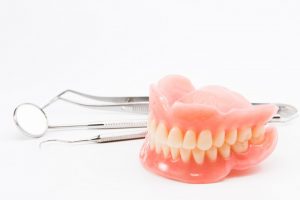 For many denture-wearers, the biggest adjustment comes with what and how you eat. The spaces surrounding dentures are prime places for food to get stuck. Dentures can also slip out of place uncomfortably when you bite into hard foods.
For many denture-wearers, the biggest adjustment comes with what and how you eat. The spaces surrounding dentures are prime places for food to get stuck. Dentures can also slip out of place uncomfortably when you bite into hard foods.
In light of these issues, choose a diet that will please your palate without displacing your dentures. See our suggestions below for plenty of great ideas about what to eat when you have dentures.
Eating With New Dentures
When you first get dentures, your gums need to adjust to chewing and biting. Your gums may also still be sore from any dental work you had to remove natural teeth. To make your first few meals with dentures comfortable, eat soft foods like:
- Hot cereals
- Applesauce
- Broth
- Pudding
- Gelatin dessert
- Mashed potatoes or other mashed vegetables
- Juice
- Yogurt
Note: Watch out for hot liquids. Dentures insulate your mouth, making it less sensitive to heat. After a few times eating hot foods, you’ll adjust to your new level of heat sensitivity.
Transitioning to Solid Foods Again
After a few days, your mouth will adjust to the dentures, and you can move onto more solid foods. Be sure to cut them into small pieces so they don’t require excessive chewing. Start by incorporating foods like the following:
- Cooked rice
- Pasta
- Soft bread
- Soup with cooked vegetables and soft meats
- Cooked greens
- Soft, skin-free fish
- Baked beans
Foods to Avoid with Dentures
Eventually, you’ll be able to eat most of the foods you’re accustomed to enjoying. Just make sure to chew thoroughly, using both sides of your mouth as evenly as possible. Even so, there are still some foods you should avoid or eat sparingly. These foods fit into these categories:
- Sticky foods. Sticky substances can move your dentures out of place, allowing food to get underneath the dentures and irritate your gums. Examples include peanut butter and gummy candies.
- Foods with small but stubborn pieces. Any food with pieces your natural teeth cannot grind or chew easily present problems for dentures. Popcorn kernels, sesame seeds on rolls, and shelled nuts or seeds can get stuck in and around dentures.
- Hard foods. Hard foods require your jaw and your dentures to apply uneven pressure. This can damage or dislodge dentures. Stay away from nuts, popcorn, apples, carrot sticks, and corn on the cob, except as an occasional treat.
- Tough meats. Foods that require many bites to tenderize them place unnecessary stress on dentures and gums. Too much chewing and grinding creates sore spots where dentures and gums meet. Avoid pork chops, steak, and ribs to prevent sores from developing.
Food to Enjoy with Dentures
If you find yourself missing any of the foods listed above, take heart! There are plenty of tasty substitutions available. Include these tasty options in your denture-friendly diet:
- Slow-cooked meats. In many cases, the longer you cook meat, the more tender it becomes. Many slow-cooking methods also add intense and deep flavors to meat. Try beef brisket, pulled pork, or pot roast.
- Ground meats. Ground meats are easy to eat with dentures because grinding them removes much of their toughness. Ground meats work in many recipes too-from casseroles to tacos to meat pies. If you don’t like the fat content of ground beef, choose lighter ground turkey.
- Non–nut protein spreads. If you love peanut butter for its mixture of sweet and salty or its high protein concentration, replace it with hummus. Made from chickpeas, this dip and spread has a mild flavor that pairs well with many spices. For a sweeter nut butter replacement, try cream cheese.
- Chocolate. Candy-lovers with dentures can still satisfy their sweet tooth with chocolate. As long as you avoid candy bars loaded with nuts, toffee, or other potential denture hazards, you’re good to go. Treat yourself to an indulgent European chocolate bar or a few handmade chocolates.
- Ripe fruits. Many fruits are naturally soft when they’re ripe and ready to eat. Whether you prefer oranges, tomatoes, peaches, bananas, or mangos, you can enjoy most fruits with dentures. For a real treat, blend fruits up in some ice cream or frozen yogurt and create a smoothie.
- Cooked vegetables. Vegetables tend to be crunchy in their raw state, but boiling, steaming, or microwaving veggies gives them a softer texture. The wide variety of vegetables means you never have to be bored with this healthy food group.
As you can see, having dentures doesn’t signal the end of your culinary adventures. Quite the contrary–having dentures may lead you to try foods you haven’t eaten in a while or to come up with new ways to prepare your favorite meals. Treat your dentures right and you’ll be eating well for many years to come.
